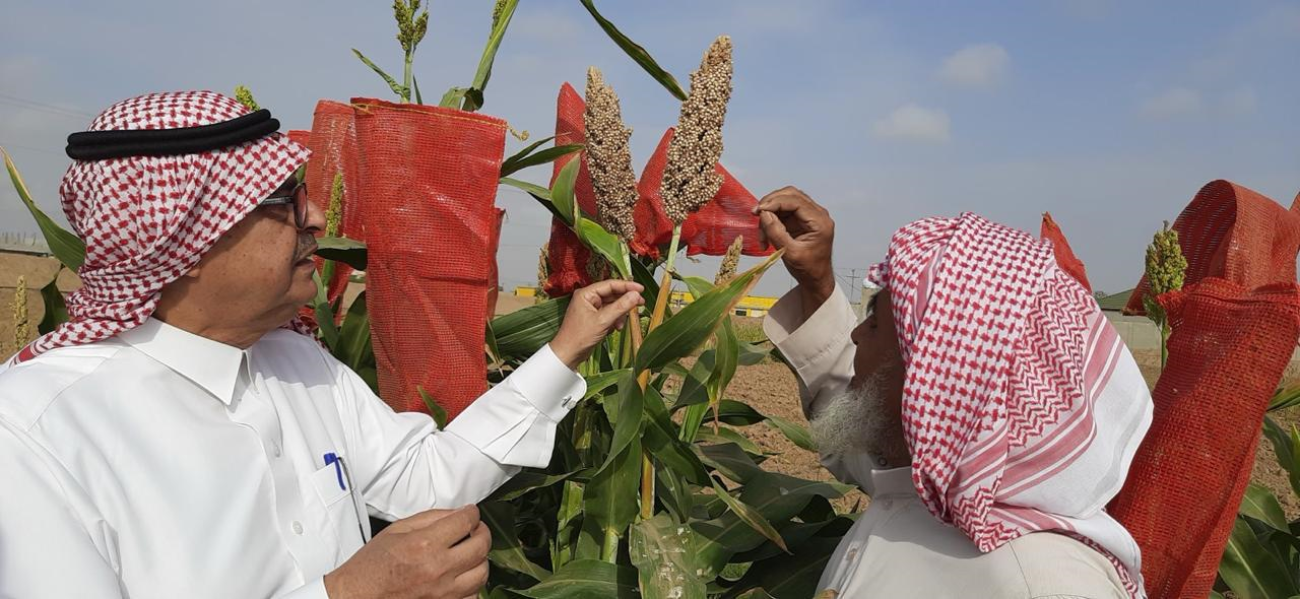Locally Led Adaptation for Resilient and Sustainable Agrifood Systems

The success story of rainfed cereals in Saudi Arabia.
In Saudi Arabia, crop production is confined to a limited area, primarily in the southwestern regions, mainly in Jazan and Asir, which receives relatively better rainfall (up to 450 mm at some areas) suitable for rainfed crops. Sorghum, pearl millet and sesame are the predominant crops in these regions, cultivated by smallholder farmers using traditional methods, occupying over 50 percent of the cultivated area. Production and productivity are constrained by factors related to lack of improved varieties and seed chains, insufficient context-specific management practices including pest and disease management and limitation in farmers` skills and capacities. These challenges impact smallholders’ income and rural livelihoods, highlighting the need for integrated policies, practices, technologies, and innovations to increase productivity while safeguarding livelihoods and the natural resources that sustain agrifood systems.
The rainfed cereals component of the ongoing Sustainable Rural Agricultural Development (SRAD) project implemented by the Ministry of Environment, Water and Agriculture (MEWA), Saudi REEF and Food and Agriculture Organization of the United Nations (FAO), focuses on introducing improved genotypes of sorghum, pearl millet and sesame. Farmers in the region predominantly grow age-old cultivars, as there is no systematic crop improvement or seed production for these crops to provide quality seeds of improved varieties. This strategic partnership is strengthening farmers’ capacities through targeted collections of local germplasm, the development of community seed banks, the creation of digital catalogues on pest and disease management, and the improvement soil and water management to enhance sustainable rainfed cereal production.
In a groundbreaking initiative, the SRAD project, in partnership with ICRISAT introduced 47 improved genotypes in 2023 comprising 24 sorghum, 12 pearl millet and 11 sesame genotypes for trials in Jazan and Asir regions. The project also trained staff at the newly established Rainfed Cereals Research Unit of the Agricultural Research Center (ARC) - Jazan, in scientific evaluation of improved varieties, pest and disease identification and management, and local germplasm collection. The team conducted trials and assessed the performance of the introduced improved genotypes vis-à-vis the best checks in three replicated trials with two planting dates both at ARC Jazan for coastal ecology and Seed Multiplication Station at Abha for mountainous ecology. Furthermore, some of the improved technologies were introduced in selected farmer demonstration fields.
Promising genotypes of sorghum, pearl millet and sesame, adapted to rainfed cereal growing regions of Saudi Arabia, have been identified and are currently under validation. Among these, one of the improved biofortified sorghum lines ICSR 14001 (Parbhani Shakti), assessed in isolated fields under farmers’ management conditions at Jazan, has demonstrated extraordinary performance. Testing showed that Parbhani Shakti sorghum genotype has outyielded the best check in the farmers' fields. It has attracted the attention of many local farmers who are eager to grow it in their fields.
Parbhani Shakti is a biofortified sorghum variety, rich in iron (Fe), zinc (Zn) and protein content, with high grain yield, larger grain size and increased biomass yield. This variety has the potential to enhance food and nutritional security in dryland areas while contributing to increasing fodder supply for livestock.
"The introduction of these improved crop varieties can usher in a new era for rainfed cereal production across the entire southwestern region of Saudi Arabia. Thanks to the local farmers, the MEWA leadership in Jazan and Abha and Saudi REEF team for their strong partnership,” said Kakoli Ghosh, Chief Technical Advisor, the SRAD project.
What began as a small idea has blossomed into an innovative collaboration effort among MEWA, Saudi REEF, FAO and ICRISAT under SRAD project, directly benefiting local farmers. As a next step, efforts are underway to establish a ‘Community Seed Bank’ aimed at supplying quality seeds of improved varieties to farmers as well as identifying sorghum and pearl millet genotypes suitable for use as multicut forages. This initiative has significant potential to increase farmers’ yields while optimizing water use compared to other crops, thereby strengthening rural agrifood systems in the region.




